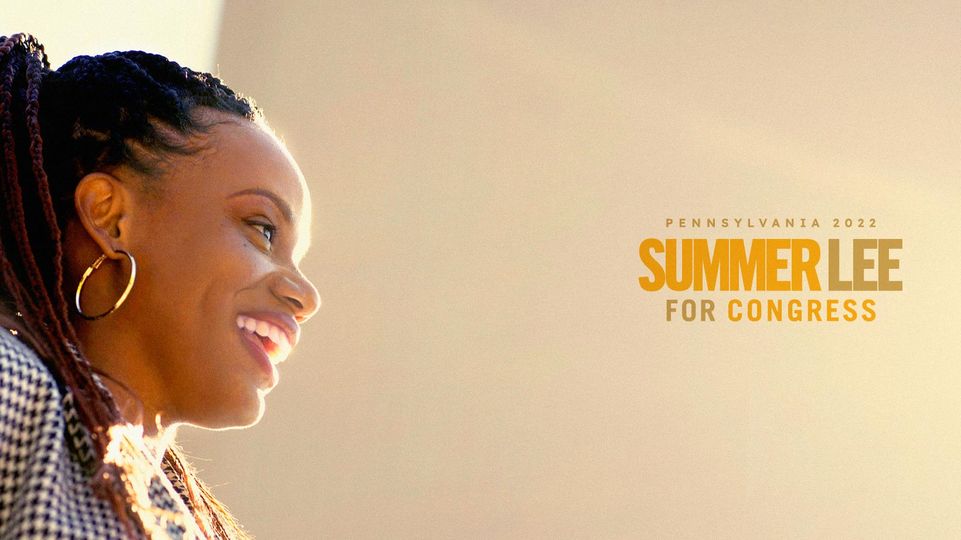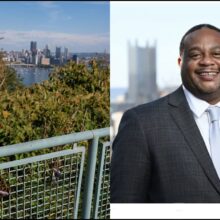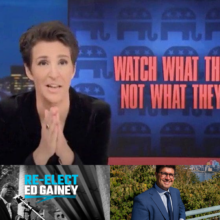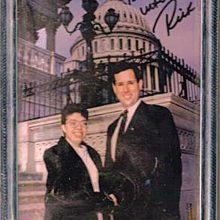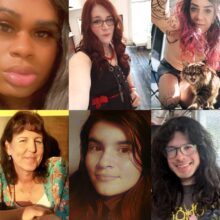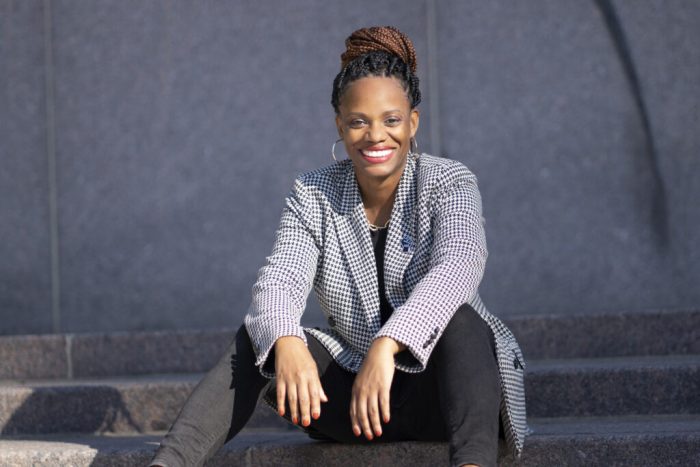
Our campaign is building an energizing and unifying movement that centers poor and working-class people, at a table big enough for everyone to have a seat. This isn’t about me, or any one person. We don’t take corporate PAC checks, or fossil fuel money, and we’re focused on building a multiracial, multigenerational movement, ready to deliver for all working people, and create a future where the will of the people always comes before the profits of corporations.
This is the next post of our 2022 primary election season series ‘Political Q&A’ with progressive candidates throughout Pennsylvania. Candidates can be anywhere in Pennsylvania running for any level of office. Please note that these are not necessarily endorsements, more of an opportunity for candidates to connect with the LGBTQ community, progressives neighbors, and others with an interest in Western Pennsylvania. If your candidate would like to participate, please contact us pghlesbian at gmail dot com. We welcome candidates at all levels of government across the entire Commonwealth
By participating, candidates are saying that they
- must be an LGBTQIA+ ally
- identify as pro-choice
- must affirm that President Joe Biden won the 2020 election and that you accept the certified Pennsylvania’s election results
Summer has participated in previous Q&A’s since her dynamic first race for the Pennsylvania General Assembly in 2018. She actually reached out to me in 2017 to discuss LGBTQ issues. And she’s never stopped advocating, creating a better world, and holding us all accountable for doing the same. She fearlessly tilts at institutions that try to hold her (and us) back, but she’s not chasing dragons. She’s rolling up her sleeves and doing important work.
One thing that I’ve noticed on social media is how she weaves her personal life into public policy in a way that’s authentic and accessible. She described trying to buy a house in her district, the challenge of affordability and racing to get a offer in before it was scooped up by someone else in the market. It wasn’t amusing, it was a real glimpse into the frustrations so many people experience. Since becoming a homeowner, she’s posted about the ups and downs, searching for reliable contractors, asking for advice. Being real and reflective about her day-to-day life creates a unique relationship with an elected official that makes her more “us” than “them” and that’s very powerful.

Your Name: Summer Lee
Your Pronouns: She/Her
Office You Seek: US House of Representatives, PA-12
How do you describe your identity? I am a cis, heterosexual Black woman who grew up working class in the Mon Valley.
You are running for reelection to your seat in the PA General Assembly and for Congress. This is not atypical at all, especially for white cisgender male candidates. Explain why you made this choice? What happens if you win both races? I’m running for both state and federal House, as many of my colleagues do when they’re running for higher office, because I am committed and honored to serve. I’m doing it because I believe in the power of co-governing and democracy, and because there’s so much to fight for. As the first Black woman in the legislature from Western PA, one of the few women in the state legislature overall, and as someone who’d be the first Black Congresswoman in PA history, and as someone who grew up poor and working class, I’m bringing a unique perspective in government, and we need more of that in our democracy. As an organizer, advocate, and neighbor, I’m grateful that the people of the 34th have chosen me to go to Harrisburg twice – with 67% the first time, and the second time with 77 percent of the vote. When I win both seats, I will humbly serve in Congress, and there will be a special election to fill the 34th District – now, post-redistricting, one of the new minority-opportunity districts in the Commonwealth.
The truth is, throughout our nation’s history, we have never delivered on the promises of democracy. The legacies of slavery and Jim Crow have carried on through gerrymandering, voter disenfranchisement, and voter suppression making the ballot box inaccessible for poor, Black and brown communities across the country. What’s at the core of this crisis? White supremacy and it’s ties to wealth consolidation for the tiny few. We have to be clear about that.
Tell us about your district. What is a hidden gem most people might not know about? I love my home community and our district for too many reasons to name – but one thing that has been on my mind and heart lately is that this district sums up so much of America’s labor movement’s history and it’s future.
Growing up in Steel Valley, I always knew that it was our communities’ labor that built this country. From Homestead to Braddock, everyday workers created the steel industry that allowed this nation to thrive. These workers bravely organized together to fight for safer working conditions, facing relentless attacks from corporations and robber barons who profited from their exploitation.
Today, baristas in Coffee Tree Roasters and Starbucks are courageously unionizing. The health care workers on the frontlines of the COVID 19 pandemic are standing up to UPMC, for livable wages and economic justice, not relentless exploitation for shareholder profit. Folks are organizing in our communities every day to say, we don’t have to choose between decent jobs and clean air and water – we deserve both. We can build a clean energy economy rooted in good union jobs, livable wages, and a just transition. I just joined UE workers yesterday in Wilmerding, challenging WabTec to stop the proposed closure of their plant, and to instead invest in the communities from which they’ve taken so much.
We are a union town, and always have been, which is why it’s so powerful to see that in this moment, we’re also on the frontlines of building a more reflective, inclusive, expansive labor movement for the 21st Century. I believe every worker deserves a union, and here in Western Pennsylvania, we’re building the next chapter of organized labor that reflects the great breadth and diversity of today’s workforce, across race, gender, and industry.
How has redistricting impacted your district? Pennsylvania’s 12th Congressional District map is the district “of least change”, it was always one of the most Democratic seats in the country, but it is now more Democratic than it was before (D+15 from D+13, to use the Cook Political Rating Scale). We now have the entire city of Pittsburgh, many of the suburbs to the south and northeast, and much of the Westernmost parts of Westmoreland County, including Irwin, Murrysville, and Jeanette. This district lost some areas including Wilkinsburg, Forest Hills, parts of Swissvale, including my own home precinct – the only precinct-level cut in the entire county which is right around my house.
In the State House, the 34th District I’ve been proud to represent and won overwhelmingly for two terms is a majority-white, majority suburban seat – since redistricting, it is now one of three minority opportunity districts in the Commonwealth.
Tell us about your familiarity with the LGBTQ community in your district and the region. I have always been and will continue to be a friend, ally, and fighter for the LGTBQ+ communities across our region. I’ve served proudly on the Equality Caucus, fighting for an LGBTQ-inclusive budget and policy priorities to end discrimination against LGBTQ+ communities in housing, employment, health care, education, and in our prison and policing systems. I’ve worked in partnership with community groups like Sisters Pgh, and as board member of the Alliance for Police Accountability, to co-govern, fighting at state, municipal, and federal level for policies that protect and support our LGBTQ+ communities – especially our trans and gender-non-conforming siblings who face so much systemic injustice and transphobic violence across our governing institutions. My campaign manager is a lesbian, and from senior staff to voters to volunteers, from legislative offices to campaigns, I’ve always strived to build workplaces that are inclusive, diverse, and equitable.
Based on this, what do you now understand to be our top LGBTQ concerns and priorities for Congress? How will you respond to those priorities? This campaign is about delivering real power to all working class and marginalized people – and building towards real environmental, economic, and racial justice for all, through a more responsive and reflective democracy, and working for LGBTQ+ rights and priorities will be an integral part of that. The struggle for LGBTQ+ rights is among the defining civil rights issues of our time. Congress must pass the Equality Act to provide long overdue federal protections for LGBTQ+ people and their families. Right now there are no federal
standards to prohibit discrimination against LGBTQ+ people in health care, housing, employment, education, and in our criminal legal system. Beyond these fundamental protections, we must focus on meaningful representation for the LGBTQ+ community in politics, ward off a right-wing Supreme Court attempting to roll back LGBTQ rights based on “religious liberty,” and address the many disparities that the LGBTQ+ community faces in affordable, inclusive health care, including mental and reproductive health.
What have been your accomplishments in the PA General Assembly? In 2018 I ran a history-making race for the State House, doubling voter turnout, winning with more than 67 percent of the vote, and unseating a 20-year incumbent to become the first Black woman from Western Pennsylvania ever elected to the state legislature. Since taking office, I have been a voice for people across the district – championing initiatives that support sustainable jobs, environmental responsibility, police accountability, and gender and racial equity. In a Republican-held legislature, during the summer of protests in support of Black lives, when Republicans had vowed to advance no bills introduced by Democratic colleagues, and only bridge-naming bills were moving due to rightwing obstructionism, I organized my colleagues to hold the floor – and successfully pushed through some of the only substantive bipartisan legislation of the term. Through that action, we passed urgently needed police accountability measures, including a databasing bill that could have saved the life of Antwon Rose, my constituent, and consent measures to block sexual assault of those in custody. As an organizer and an elected official, I have been a tireless advocate for workers’ rights, union protections, and the fight for a liveable wage. I have taken on fossil fuel corporations and won, working with community leaders to stop a dangerous fracking proposal in its tracks. I have brought millions back to our community for infrastructure upgrades and community revitalization, including roads, bridges, and libraries. Now, I’m running for Congress in Pennsylvania’s open 12th District to build a brighter future for all working people across my home district.
Are you absolutely committed to a fully inclusive Equality Act (including gender identity)? Would you vote for a version that focuses on sexual orientation and not gender identity? I am 100% committed to a fully inclusive Equality Act. The struggle for LGBTQ+ rights is among the defining civil rights issues of our time. We need long overdue federal standards to protect LGBTQ+ folks and their families from discrimination in housing, health care, employment, etc. I would not support an Equality Act that excludes trans and non-binary folks because I’m a firm believer in Martin Luther King Jr.’s core principle that “no one is free until we are all free.” We’re building a movement that is unified in understanding the lived experiences of people who face systemic inequality based on race, gender, sexuality, and class; That means we continue
fighting for a fully inclusive, comprehensive Equality Act, and we don’t settle for anything less. While certain voices may now be heard in various spaces of power, we still need to fight for access, visibility and action for those who are not.
The threats of ‘religious liberty’ laws and exemptions target both LGBTQ rights and women’s rights. Pennsylvania has no law protecting marriage equality, second-parent adoption, nondiscrimination, or similar important rights. If SCOTUS overturns or waters down Roe v Wade and the ‘penumbra of privacy’ protecting us, what do you anticipate happening in Pennsylvania and nationally? A future without these fundamental human rights is untenable. We know this. We know that the LGBTQ+ community, young people, and Black and brown folks will suffer the most if SCOTUS overturns or waters down these protections. In Pennsylvania and other states with Republican-held legislatures, folks are even more at risk of the life-threatening consequences of a world without LGBTQ and abortion rights. That’s why I’m fighting to codify these rights in Congress to ensure that we don’t leave these critical protections in the hands of a far-right Supreme Court. I’m also a strong supporter of expanding the Supreme Court to send more women like Justice Kentaji Brown Jackson to the Supreme Court so they may not speak only in dissent, but to build real power to protect women’s and LGBTQ+ rights.
There are comparisons of your campaign with members of ‘The Squad’ – Representatives Alexandria Ocasio-Cortez of New York, Ilhan Omar of Minnesota, Ayanna Pressley of Massachusetts, Rashida Tlaib of Michigan, Jamaal Bowman of New York and Cori Bush of Missouri. How does this comparison resonate with you? Have you had any contact with those Congress members? I’m consistently inspired by The Squad and progressives across the country who are building power to fundamentally change the political landscape in just the past few years, and I’m honored to have the endorsement of national progressives like Senator Bernie Sanders, Rep. Ayanna Pressley and Rep. Pramila Jayapal, alongside the 98-member Congressional Progressive Caucus. They’ve done so much for working-class representation in Congress, and that further empowers candidates like me to run on key issues that impact working-class communities, like a Green New Deal, Medicare for All, and transforming our economy. But I’m Summer Lee from Pennsylvania, and I’m running this race as myself – as a lifelong member of this community; as a working-class candidate who understands the economic insecurity of living check to check; as someone who knows what it’s like to try and find care without health insurance; as someone still saddled by student debt that dictates every financial decision I make. I understand the urgency of our problems because I live them. I’m also the only Democratic official in the race, the only woman, and the only candidate who has already proven that she can represent this community, expand the electorate, increase voter turnout, and deliver real results for our district.
We talk about reproductive justice, environmental justice, racial justice, health care justice where justice is a specific framework that’s larger than one individual’s rights. Why aren’t we talking about voting justice instead of voting rights? Would that be a useful framework in the current environment? We talk about voting justice and reflective democracy all the time! I hear it on the ground – people are worried about white supremacist authoritarianism, with democracy being under attack and Congress failing to act. The truth is, throughout our nation’s history, we have never delivered on the promises of democracy. The legacies of slavery and Jim Crow have carried on through gerrymandering, voter disenfranchisement, and voter suppression making the ballot box inaccessible for poor, Black and brown communities across the country. What’s at the core of this crisis? White supremacy and it’s ties to wealth consolidation for the tiny few. We have to be clear about that. This is absolutely an issue of systemic justice that is collective and far-reaching, extending far beyond the individual.
In order to fulfill the promise of democracy, it’s time that the Democratic majority in Congress act on these outdated and arbitrary laws. We must end the filibuster, a tool championed by segregationist Senators to oppose civil rights legislation, that still often stands in the way of progress today. Voting rights framework also includes expanding federal courts and the Supreme Court so that right-wing extremists can’t strip away our fundamental rights. We must end Citizens United, challenge corporate money’s stranglehold on our political process, and pass real campaign finance reform so that our elected officials are more accountable to working people and the folks we’re supposed to represent than a tiny handful of wealthy donors. Our democracy has long been broken, but with an expansive, comprehensive framework, we have the tools to fix it and build a more reflective democracy.
I don’t think Harrisburg has the will to move forward on Infrastructure funding. Convince me otherwise. Throughout my time in the Republican-held legislature, my Democratic colleagues and I have worked tirelessly to invest in our communities’ infrastructure. We must ensure our roads, bridges, water pipes and buildings are fully funded – and we must prioritize using the mechanisms available at the state, local, and federal level to make that possible. I hear from my constituents every day on these issues; voters overwhelmingly support broad and consistent investments in the crucial infrastructure that keeps our communities safe and thriving. No one should drive over the many bridges in Pittsburgh terrified that they will collapse; no one should struggle to get to work, school, or family due to gutted public transit and crumbling roads; and no one should drink water from aging pipes filled with lead and preventable contamination. Infrastructure funding is about prioritizing people and public safety over corporate profit.
Sadly, Harrisburg is currently held by Republican obstructionists and their allied corporate donors, who have consistently prioritized legislative attacks on marginalized people and protecting corporate profit as much as possible over everything else. They advocate for gutting infrastructure in order to protect corporate tax breaks, and while pushing to punish queer andtrans youth and families, in athletics and education, to attack immigrants and refugees, and to undermine crucial progress on voting rights, reproductive freedom, and workers rights.
Harrisburg power structures do, in fact, lack the will – but voters don’t. Voters overwhelmingly agree with Democratic progressive values and want to see quick change that improves our lives and the lives of our friends, family, and neighbors.
As far as infrastructure at the federal level goes, the recent infrastructure bill was a necessary first step, but we must understand it as the floor, not the ceiling, of the work that needs to be done.
It would only have reduced carbon emissions by 1 percent, from 2005 levels by 2030. When passed along with Build Back Better, the impact doubles and the climate investments in Build Back Better make a far more significant dent. The Bipartisan Infrastructure Deal also only provides about 5 percent of the funding Pennsylvania needs for our bridges. This is the kind of holistic view I’m taking to Congress. It’s not enough to stick a bandaid on the metaphorical bullet wound, and then call it a day. In a district like Pennsylvania’s 12th, we deserve a representative who will go to Congress and bring people together to win the bold solutions that meet the scale of the need, not just a dollar amount that looks nice in a press release. I’ve fought for big, bold solutions in the State House and I’ll be that effective leader in Congress.
Voter turnout is a significant concern, especially for municipal/local elections. What advice would you offer to organizations and groups concerned with turnout in Western Pennsylvania? When we made history in my very first campaign for State House in 2018, we doubled voter turnout, across all measures, and dramatically transformed the electorate, and I’ve continued that electorate-expanding commitment ever since. A quarter of voters in my historic primary were “new” or “unlikely” voters – folks who hadn’t participated in a midterm primary like that before – whom we engaged over the long haul and welcomed into the political process.
We must center a politics around “high-potential” voters, the voters too often ignored and deprioritized by traditional politics and both political parties. Young voters, Black and brown voters, working class and marginalized voters, are often dismissed in favor of high-turnout “swing” voters – overwhelmingly white, more affluent, and more conservative electorates. This is disenfranchising and harmful to our democracy – but it’s also a losing strategy. Instead, our people-powered campaign is building a more reflective democracy – able to connect with voters at scale about their values, early and consistently, and prove that this political process is not just for the wealthy or well-connected, but for all of us.
That’s why I founded UNITE, the grassroots PAC that has since we launched in 2019 helped elect waves of progressive leaders up and down the ballot, from Mayor to school board to county council, connect with high-potential voters, and build power for the short and long term. We’re building a movement that centers the communities who have long been left behind by the status quo, and we have to make the investments necessary to reach those folks and build trust in those communities. This is strategically essential not just for me or my race, but to ensure victory for Democratic Senate and Governors races as well – and to create the future Pennsylvanians deserve.
How can supporters get involved with campaigns while practicing social distancing and other protocols? Phone banking is a great way to help reach voters and you can make calls from your home! We host regular virtual call parties so folks can stay COVID-safe and still find community while they volunteer. Door knocking is also entirely outside and a great way to get involved in-person while still safely social distancing. We also encourage mask wearing and of course for folks to get vaccinated and boosted if they haven’t already. Folks who are interested in volunteering for our campaign can visit https://www.mobilize.us/summerleeforcongress/ to find an event that feels comfortable for them and get signed up.
We are a union town, and always have been, which is why it’s so powerful to see that in this moment, we’re also on the frontlines of building a more reflective, inclusive, expansive labor movement for the 21st Century. I believe every worker deserves a union, and here in Western Pennsylvania, we’re building the next chapter of organized labor that reflects the great breadth and diversity of today’s workforce, across race, gender, and industry.
Finally, what are three reasons people should vote for you/support your campaign? Born and raised in the Mon Valley, I am an organizer, legislator, and a proven fighter for environmental, racial, and economic justice. I’ll never stop fighting for a future where all people can thrive. I understand the urgency of the issues facing the people of PA-12 because I live them every day, and I’m not afraid to challenge the status quo to get results for communities that have too often been ignored.
I’m the only one in this race who’s proven how to build strong people-powered campaigns to win, who has dedicated her life to making real progress on racial, economic, and environmental justice for all, and who has brought coalitions together to take on rightwing authoritarianism and corporate abuse, and win. Our campaign is building an energizing and unifying movement that centers poor and working-class people, at a table big enough for everyone to have a seat.
This isn’t about me, or any one person. We don’t take corporate PAC checks, or fossil fuel money, and we’re focused on building a multiracial, multigenerational movement, ready to deliver for all working people, and create a future where the will of the people always comes before the profits of corporations.
Please tell us about your endorsements.
Summer Lee has been endorsed by a broad progressive coalition of leading organizations and individuals, including Senator Elizabeth Warren, Senator Bernie Sanders, EMILY’s List, the entire 98-member Congressional Progressive Caucus PAC, United Electrical, Radio and Machine Workers (UE), SEIU 32BJ, SEIU 668, SEIU PA State Council, SEIU HealthCare Workers PA, UFCW 1776, Pittsburgh Federation of Teachers, American Federation of Teachers – Pennsylvania, J Street, Justice Democrats, Working Families Party, Democracy for America, Progressive Change Campaign Committee, Way to Lead, Higher Heights PAC, End Citizen United/Let America Vote, Collective PAC, Future Generations PAC, Blue America PAC, Emgage PAC, 14th Ward Independent Democratic Committee, Steel City Stonewall Democrats, PA United Allegheny County, Young Democrats of Allegheny County, the League of Conservation Voters, Sunrise Movement, Zero Hour, Food and Water Watch Action, The Center for Biological Diversity Action Fund, Free the Ballot, and Friends of the Earth Action, and Congressmembers Ayanna Pressley, Pramila Jayapal, Ilhan Omar, and Rashida Tlaib, Mark Pocan, Cori Bush, and Jan Schakowsky.
She has also been endorsed by state and local elected officials including the Mayor of Pittsburgh, Ed Gainey, Pennsylvania House Democratic Leader Rep. Joanna E. McClinton, Pennsylvania House Democratic Whip Rep. Jordan A. Harris, Pennsylvania Legislative Black Caucus Chair Rep. Donna Bullock, State Rep. Tina Davis, State Rep. Jason Dawkins, State Rep. Danielle Friel-Otten, State Rep. Elizabeth Fielder, State Rep. Rick Krajewski, State Rep. Chris Rabb, State Rep. Sara Innamorato , State Rep. Jess Benham, State Rep. Morgan Cephas, State Senator Nikil Saval, Former State Representative Jake Wheatley, Allegheny County Council President Pat Catena, Allegheny County Councilmember Bob Palmosina, Allegheny County Councilmember Bethany Hallam, Allegheny County Councilmember Anita Prizio, Allegheny County Councilmember Jack Betkowski, Philadelphia City Councilmember Kendra Brooks, Philadelphia City Councilmember Helen Gym, Pittsburgh City Councilmember Deb Gross, School Board Director of Bethel Park Dan Gryzbyk, School Board Director District 9 Gene Walker, Wilkinsburg Mayor Dontae Comans, Mayor of Braddock Delia Lennon-Winstead, Former Braddock Mayor Chardaé Jones, Mayor of Homestead John Burwell, Former Braddock Borough President Tina Doose, Former Wilkinsburg School Board Director Ashley Comans, Homestead Borough Councilmember Mary Nesby, and O’Hara Township Auditor Darwin Leuba.
What are you social media and donation accounts?
https://www.instagram.com/summerleeforpa/
Thank you, Summer.
To participate,
- you must be an LGBTQIA+ ally
- identify as pro-choice
- you must affirm that President Joe Biden won the 2020 election and that you accept the certified Pennsylvania’s election results
Other Q&A’s in this election cycle series. You can read previous cycle Q&A’s here. Responses from this election cycle are listed below in the order they were returned by the campaign.
- Q&A With NaTisha Washington, Candidate for PA House District 24
- Q&A With Jerry Dickinson, Candidate for U.S. Congress PA-12
- Q&A with Emily Kinkead, Candidate for PA House District 20
- Q&A with John Fetterman, Candidate for US Senate
- Q&A with La’Tasha Mayes, Candidate for PA House District 24
- Q&A with Jessica Benham, Candidate for PA House District 36
- Q&A with Deja Alvarez, Candidate for PA House District 182
- Q&A with Summer Lee, Candidate for US Congress PA-12
